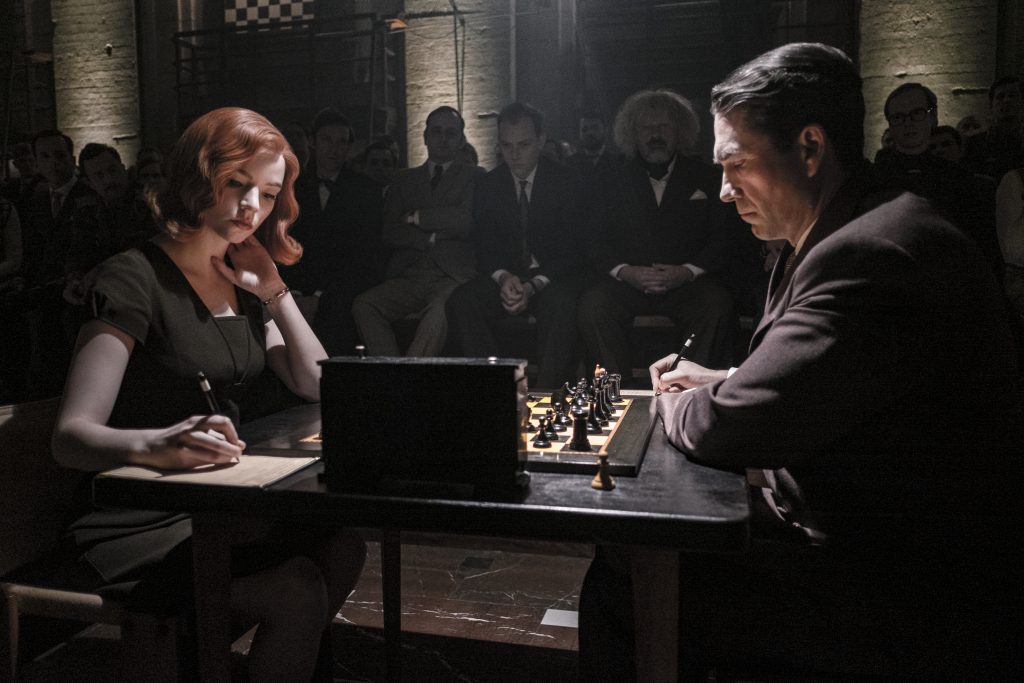In Netflix’s acclaimed series The Queen’s Gambit, music plays an important role in accessing the internal, emotional core of chess prodigy Beth Harmon (Anya Taylor-Joy), and Emmy-winner Carlos Rafaeal Rivera rose to the challenge of displaying her growth through music.
The classical, orchestral score became a focal point for the series that follows Beth, who is introduced to the game of chess while living in an orphanage, and her meteoric rise to playing against the Russian Grandmasters in Moscow while overcoming her addiction problems.
The score emphasized the connection between Beth’s colorless world in the orphanage and the colorful movement of her character through emotional strains as she battles her inner demons alongside world-class chess players.
“I realized that the story is told from Beth’s point of view, so I had to stay on character,” Rivera shares. “I ended up trying to make sure that the music revolved around her character more than her environment.”
Rivera spoke to Awards Focus about finding musical cues within Beth’s story, working alongside series creator Scott Frank, and the bittersweet experience of taking home his first Emmy for the Netflix series Godless.
Awards Focus: Composers are known to be relatively reserved when it comes to compliments. Knowing that, how does it feel to hear such widespread, peer-driven praise for the Queen’s Gambit score?
Carlos Rafael Rivera: I’m seriously blown away by exactly that. I am so taken by the fact that people whom I have listened to for years and years have reached out. As a fan — for anybody who takes their time to say something — it means the world to me.
Awards Focus: When you’re trying to figure out that sense of narrative “fit,” what do you look for?
Rivera: Well, if I get the whole chunk of story, like the whole screenplay, then I’ll look through the episodes for set pieces. You know when you start reading a novel, you sometimes feel as if a specific type of music would be good for this scene, right? Like you imagine music that would fit perfectly. Those are the first ones I hit because I think they’re going to be problematic later, and I’d rather handle the problem now.
Usually it happens with montages. For montages, music is a necessity. Because our job is really a transition job. Like in olden theatrical performances, they lowered the curtain to change the set and music would play in between to keep your disbelief suspended. Similarly, when they end the dialogue for one scene, move to an exterior, and commence dialogue in another area, that’s where music does its job. We’ve inherited that sort of past and our work is primarily transitional.

AF: How did that process go for The Queen’s Gambit? Which pieces did you write first?
Rivera: It just so happens that one of the first things I wrote for the screenplay was the last sequence of the show, when Beth walks around in the park with all the players. I read that scene in the novel and started thinking about what piece that would be. Once I got the screenplay, I wrote it and sent it to Scott (Frank). That and the main title were among the first things I wrote.
These things are always evolving, and I’m very much used to the idea of throwing pieces away. It’s disposable, because it’s not helping Scott’s vision. When it came to the final scene, I had to take a step back. I started thinking, it doesn’t have any of the melodies from before, but it somehow feels like it fits. It feels like a brand new day. So I considered that totally new music would feel like a refresher. As if she’s become realigned, at least at this moment in her life.
AF: Having spent so much time with the material, do you ever feel the urge to know what happens next in Beth’s story?
Rivera: I live at the service of the director and the storyteller. So if he wants to do it, then I couldn’t be more excited to explore what would happen. But I don’t think he has any interest. And considering Walter Tevis’ novel, I felt like there are still a lot of broken things about Beth’s situation. She was okay, but that doesn’t mean she won’t go on a binge in a week. But I think that’s what makes her character so relatable to many people.
AF: Beth certainly does like to maintain interpersonal distance.
Rivera: Well, she’s thinking, “If I get close to you, you may try to kill yourself and me with you.” Just like how her mother tried to. And anything further than that can be uncomfortable. Actually, Beth is quite an unlikeable character in the books, and it’s only through the actor that we come to care about her so much. Also, the writing had a lot of moments that displayed the conflict inside her. But in the books she seems to have no empathy. She’s just a chess machine, and it can be off-putting.
I was drawn to that, but I’m not sure what a sequel would look like. I don’t think anyone does, but Scott can make anything good. I always joke that I enjoy reading his emails, because he’s simply such a good writer. He says anything he writes is right. So I’m sure he can make something wonderful, and I’d be excited to do it.
AF: How did the changes in setting, such as Vegas or the Soviet Union, influence the tone of your pieces?
Rivera: It’s funny. When I read about her going to Mexico in the novel, I got excited since I’m Latino. I was like “Oh dude, this is gonna be so easy.” And then she goes to Paris, and I thought it would be fun to write something for that setting, especially since she seems to be having such a fun time. And then of course she goes to the Soviet Union.
Then I started doing that but the pieces were all sucky. They were all bad. Really bad. It seemed like trying to write music associated with the places wasn’t working. At the same time, I realized that the story is told from Beth’s point of view, so I had to stay on character. I ended up trying to make sure that the music centered around her character more than her environment.
AF: You first began working with Scott (Frank) when he asked for guitar lessons. When did he become more aware of your larger aspirations? Did that come out early, or was it something that came out over time as you built the relationship?
Rivera: I think it’s the latter. I started teaching as soon as I’d gone back to get my doctoral degree and it just turned out that Scott contacted me because he was interested in lessons. I walked into his office and saw posters for things he’d written. Back then he was a writer – he hadn’t directed anything yet. And so I never thought it would be the amazing opportunity that it turned into.
We had really good lessons because he wanted to learn about music as a whole, not just guitar. I was thrilled to do it, because it’s what I love to talk about. But overall it was a conversational thing, and I didn’t really think of it as an opportunity.
Around five years into our lessons, Scott said, “Carlos, we’ve been doing this for a while, but you’ve never asked me to hook you up.” And I said that my role in his life was as a guitar teacher, and it wasn’t my place to presume that he would do that.
The first thing he asked me to do was help with a project he was working on. He’d been writing a script, which he sent to me, and I started putting together pieces in iMovie. I was really just trying to find a way, because I honestly wasn’t expecting to even have the job. I thought Scott would be working with another composer. So at the time, it was just another experience for me.
AF: What were some lessons you drew from that experience with Scott Frank?
Rivera: Every single thing I’ve been able to do with Scott have been learning experiences. I made some mistakes in the beginning. For example, on the first project, I ended up cutting the picture. He’d sent me a scene, and it was one of the first scenes I’d ever written music for. But the beat wasn’t lining up with the picture. So I cut the picture, made it line up with the music, and sent it to him. Then he called me and said, “Did you cut the picture?” And I go, “Yeah, isn’t it better now that it works with the music?” And he said, “Carlos, no, no, no. You don’t cut the picture. You write to the cut.”
I apologized and said I didn’t realize. Then half an hour later, the editor called me and asked if I cut the picture. I apologized again, and he told me that I didn’t need to do that. Honestly, I should have been fired for that alone. But I learned, you know. I learned by failing a lot.
AF: You took home an Emmy in 2018 for the main title theme in Godless. Can you talk about how that felt?
Rivera: I got the call about the nominations from Beth Krakower, who is a PR person. Unfortunately, she passed away that year. She ended up having cancer and publicly speaking about it and beating it. So we’d been checking in when Godless was coming out.
She asked if I wanted her to represent me with all the PR stuff related to Godless. I was concerned, but she was in remission at the time so we ended up working together. But then things got rough with her cancer again, and she said she’d be back. I asked if she wanted to find someone else to do the PR, but she insisted on continuing to work with me. She said, “No, no, no, we’re going all the way up. We’re gonna see this all the way through.”
So she called me when the nominations came out. And I was crying the whole time. That was the biggest moment. But when we got to the award, she’d passed away. So I mentioned her when I received the award, and I said, “Beth, this is for you.” That was one of the weirdest things. It was very bittersweet and very unexpected.


